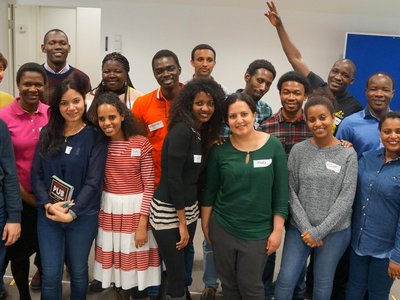

Margret Steixner who gained her PhD by researching on intercultural competence in the field of development work and Katharina Engel from the OeAD who has long lasting experiences on intercultural skills facilitated the workshop. To start with, the students had to look for quotes from their countries, as the one mentioned above. Thinking about values, behaviour and attitudes in their respective culture helped the participants to understand the impact of culture on developing their identity. In the next exercise they reflected on determining factors such as family, education and the socio-economic status. The reflection was followed by a presentation of Margret on theories such as the onion model or the different dimensions of culture. In addition, she gave insights on how communication across cultures works. One participant stated “that the metaphor of the onion helped to understand incidents that previously seemed to be difficult to comprehend. Not understanding the value behind the behaviour creates a lot of confusion on both sides.” Margret gave one possible definition of intercultural competence, namely “to be aware of cultural difference and to manage difference in a constructive way”.
This theory session was followed by a reflection on the personal communication style. Generally, one can differentiate between direct and non-direct communicators. Direct communicators will make explicit statements and directly address the people involved; sometimes they might jump into a discussion even by ignoring contextual factors. On the contrary, indirect communicators are much more aware of the implication of their message, refer to nonverbal behaviour and the contextual setting and do not always directly address the receiver. Having the theoretical input the participants were asked to think about their communication and working styles. The students presented critical incidents, e. g. working with colleagues at the university or the relationship with scientific supervisors. They talked about solutions and discussed best practice examples by jointly exploring strategies and new ways of dealing with challenging situations. Furthermore, Margaret gave tips for indirect communicators (e.g. develop agenda beforehand, communicate precisely and clearly and don‘t interpret too much) and direct communicators (e. g. reflect possible alternative meaning, listen to different people and viewpoints, be sensible for body language).
In the afternoon the participants were requested to “explore Austria” and to find out more about history and culture. For this exercise two groups were formed; the students received a map and a description where to go. They had several questions to answer concerning the Austrian Parliament, the University of Vienna, the City Hall and the waste management system. They could use information material that was provided, the internet or ask people on the streets. Our scholars had two hours to complete the tasks and were accompanied by Margaret and Katharina as silent observers. After coming back to the OeAD house the trainers awarded points for all findings with regard to 1) the „exploratory journey” 2) the interaction in the group and 3) the creativity for the presentation.
This workshop gave opportunity to reflect on cultural and social aspects of the personal and professional reality. Based on the experiences as a student in Austria concepts of communication and working styles were discussed and new ways to deal with challenging situations were developed. One participant concluded that “it was helpful to see that a task that seems not doable becomes easier, doable and an enjoyable learning experience once done in a group with other colleagues.”
Margret Steixner studied Comparative Educational Science at the Leopold Franzens University of Innsbruck, Austria and holds an International Coaching Certification from Great Britain. She gained her PhD researching the development of intercultural competence in the field of development work. Margret lived and worked in several African countries and is now running her own Training and Coaching Company. Her strength is the combination of theoretical knowledge with first hand work and life experience. You can find more information on: www.intercultural-perspectives.com
Katharina Engel has been working for the OeAD for more than 25 years. She has been acting as programme manager for several scholarship programmes financed by private and public donors. Furthermore, Katharina is organizing and facilitating different events for scholarship holders and is responsible for quality assurance within the Centre for international Cooperation and Mobility. Apart from courses in quality management, Katharina obtained a certificate for intercultural training at the Intercultural Centre in Vienna.
